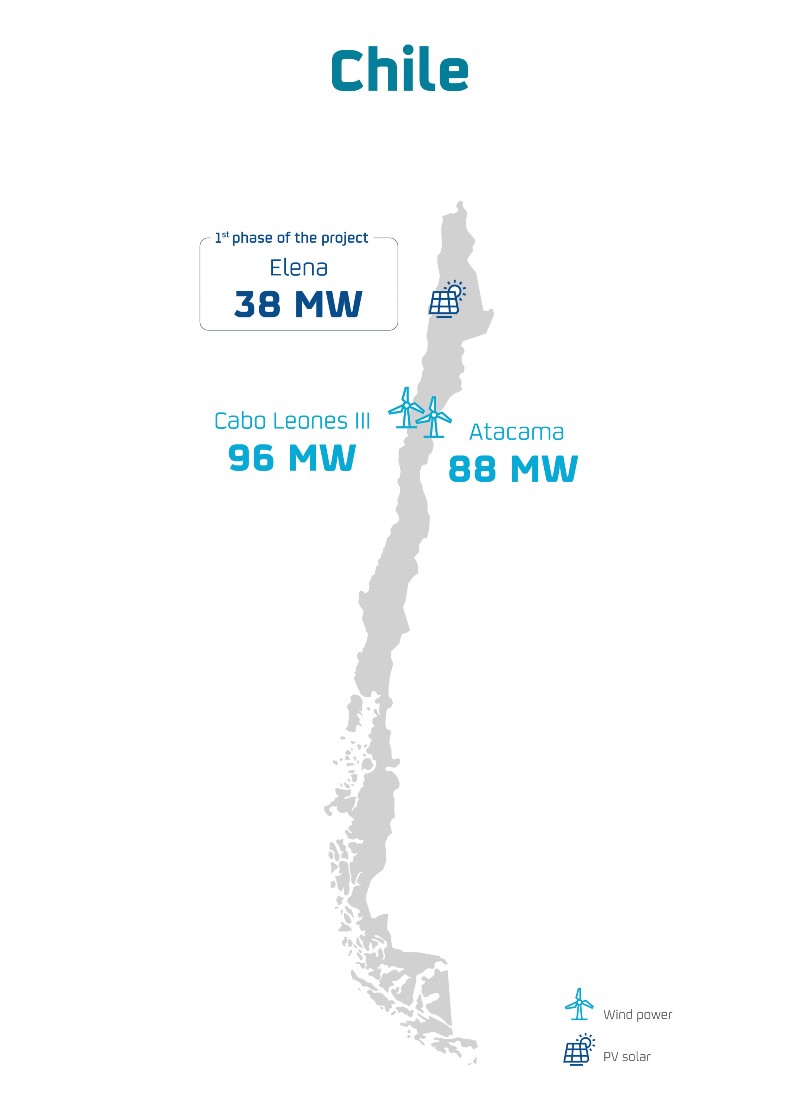Repsol and the Ibereólica Renovables Group’s first solar project in Chile begins producing electricity
- The first 76.8 MW phase of the Elena solar plant, which will have a total installed capacity of up to 596 MW, has been commissioned.
- This is Repsol Ibereólica Renovables Chile's third joint project in operation, after the 192.5 MW Cabo Leones III and 165.3 MW Atacama wind farms.
Repsol Ibereólica Renovables Chile, a company owned 50% each by Repsol and the Ibereólica Renovables Group, has started producing electricity into the grid from its first joint solar project in the Andean country with the start-up of the first phase of the Elena photovoltaic plant, which will have a total installed capacity of up to 596 MW.
The first phase of the project, located in the town of María Elena in the Antofagasta Region in northern Chile, has 76.8 MW of installed capacity through 142,275 bifacial photovoltaic solar modules.
Once fully operational, the Elena photovoltaic plant will generate enough renewable energy to supply more than 554,000 Chilean households and will prevent the emission of approximately 1.19 million tons of CO2 into the atmosphere.
João Paulo Costeira, Repsol's Executive Managing Director of Low Carbon Generation, said: "Our partnership with the Ibereólica Renovables Group, a highly experienced partner with strong renewable energy capabilities, allows us to meet our growth and diversification goals in Chile, a country that offers us great potential for asset development and that will contribute to reaching our goal of 6,000 MW in operation by 2025."
Gregorio Álvarez, founder and president of the Ibereólica Renovables Group, said: "It is a great pleasure to be able to celebrate the start of electricity production from the Elena photovoltaic plant, the result of collaboration with Repsol, a partner that has once again demonstrated its commitment to the decarbonization of the country and with whom we have managed to lay solid foundations on which to jointly develop a more sustainable future for Chile."
The joint venture between Repsol and the Ibereólica Renovables Group achieved another important milestone earlier this year with the start of electricity production at the 165.3 MW Atacama wind farm, the second wind project to be developed and commissioned jointly by the two companies, after Cabo Leones III with 192.5 MW, which entered commercial operation in December 2020.
Repsol Ibereólica Renovables Chile's joint portfolio of projects in the country has approximately 1,800 MW of assets in operation, construction, or advanced phases of development, which are expected to come into operation before 2026 and with the potential to exceed 2,600 MW in 2030.
With these projects, Repsol maintains its roadmap to achieve its decarbonization goals and to become a net zero emissions company by 2050, with a current portfolio of installed renewable generation projects totaling to more than 1,800 MW. In addition to its activity in Chile, which has 217 MW in operation including the first phase of Elena, the company has 1,600 MW of installed renewable capacity in Spain, 62.5 MW in the United States, and 3 MW from the WindFloat Atlantic floating wind farm in Portugal. In addition, Repsol will develop renewable projects in Italy totaling 1,768 MW, and it will soon begin construction of its first two photovoltaic solar plants in Italy.
In December 2022, the company signed the acquisition of Asterion Energies, incorporating a 7,700 MW portfolio of renewable assets. Repsol's target for total installed renewable generation capacity is 6,000 MW by 2025 and 20,000 MW by 2030.
The Ibereólica Renovables Group continues with its goal of positioning itself as one of the largest platforms for renewable projects worldwide, after recently exceeding its first 1,000 MW in the operating phase. The company, which expects to reach 6,000 MW in operation by 2029, currently has 1,062 MW in operation and 637 MW under construction. It develops a portfolio of more than 11,000 MW of wind, hydro, and solar photovoltaic projects in different stages of development in Spain, Chile, Peru, and Brazil, of which 70% are wind projects.
